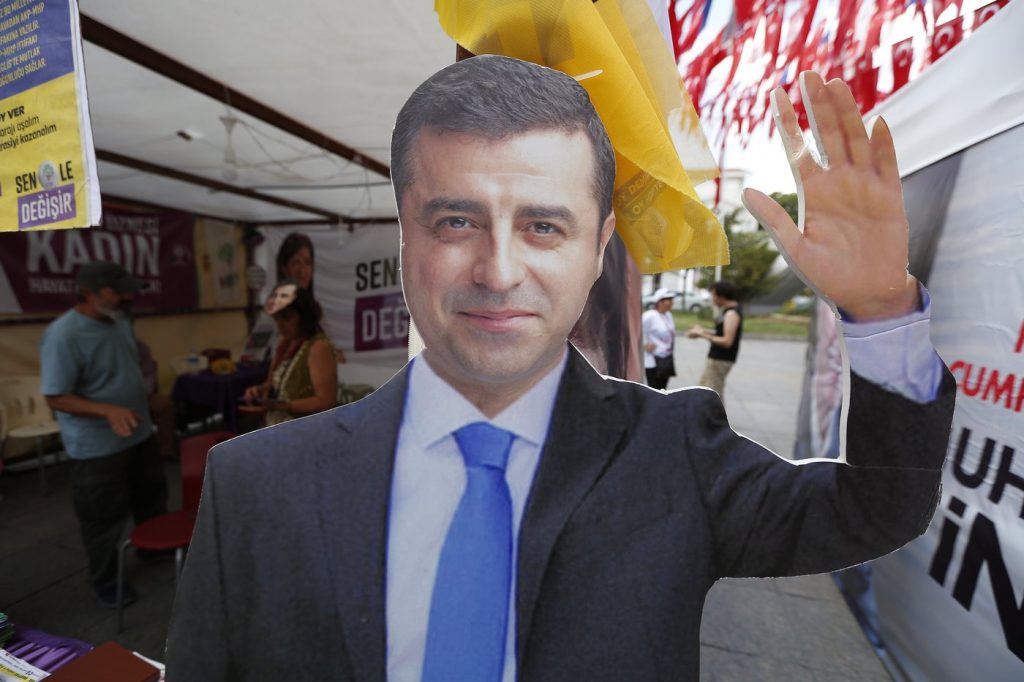ISTANBUL (AP) - A delegation from one of Turkey's largest pro-Kurdish political parties, the Peoples’ Equality and Democracy Party (DEM), held a significant meeting with Selahattin Demirtas, a prominent figure in the Kurdish movement, who is currently imprisoned. This meeting took place on Saturday at Edirne prison, located near the Greek border, marking a crucial step in the ongoing efforts to resolve Turkey's 40-year conflict with Kurdish militants.
Demirtas, who was jailed in 2016 on terrorism charges largely seen as politically motivated—an assessment endorsed by the European Court of Human Rights—met with three senior members of DEM. This meeting followed a prior encounter between DEM officials and Abdullah Ocalan, the imprisoned leader of the Kurdistan Workers’ Party (PKK), earlier in the month. The PKK has waged an armed insurgency against the Turkish state since 1984, leading to tens of thousands of deaths over the decades. The DEM, as a left-leaning Kurdish nationalist party, has faced considerable state repression, including the imprisonment of elected officials and the banning of several pro-Kurdish parties.
In a post-meeting statement shared on social media, Demirtas urged all parties involved in the conflict to “focus on a common future where everyone, all of us, will win.” He highlighted the role of Ocalan in potentially facilitating a disarmament of the PKK, noting that despite being imprisoned on Imrali island since 1999 for treason, Ocalan maintains significant popularity among Turkey's Kurdish population. Demirtas, who previously led the DEM from 2014 to 2018 when it was known as the Peoples' Democratic Party (HDP), emphasized the need for “concrete steps that inspire confidence” to be taken swiftly to progress towards peace.
One member of the DEM delegation, Ahmet Turk, expressed optimism, asserting that “Turks need Kurds and Kurds need Turks.” He articulated a collective aspiration for Turkey to evolve into a democratic nation capable of fostering stability in the Middle East.
Historically, peace efforts in the Kurdish conflict have repeatedly faltered, but the current political climate presents a renewed opportunity for dialogue. President Recep Tayyip Erdogan, during an address to supporters in Diyarbakir, Turkey's largest Kurdish-majority city, called for the disbandment of the PKK and the surrender of its weapons, framing this as necessary for the development of the DEM and for strengthening Turkey’s internal unity against regional conflicts. Erdogan referred to this as a chance to end decades of separatist violence and to consign it to history.
The latest peace initiatives gained traction when Devlet Bahceli, leader of the Nationalist Movement Party and Erdogan's ally, suggested in October that Ocalan could be granted parole if he renounced violence and ordered the disbandment of the PKK. Erdogan subsequently signaled his support for this proposition. Ocalan has conveyed his willingness to contribute positively towards peace, according to messages relayed by his family.
The evolving situation reflects a cautious but hopeful dialogue aimed at resolving one of Turkey's most enduring conflicts, with the potential for significant ramifications on the political and social landscape of the region.










